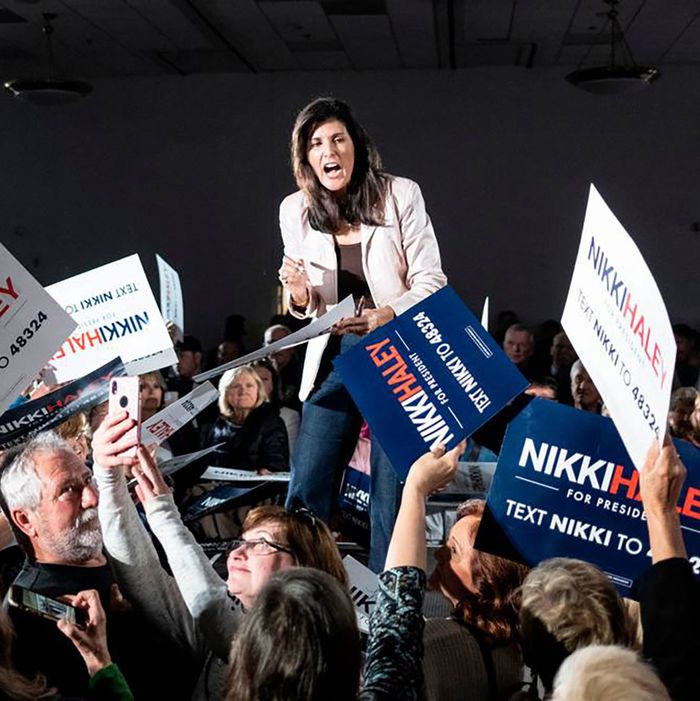
The fear about 2024 for the moneymen and party-Establishment types who want to see the Republican Party move on from Donald Trump was always that this primary would be a redux of the last one in 2016, where a split field allowed him to prevail.
That does not appear to be happening. Candidates with lofty pedigrees (Mike Pence) and with millions of dollars in their campaign accounts (Tim Scott) are quitting the race. The debate stage is shrinking. Donors are closing their wallets to vanity runs, and grassroots leaders are shuffling the also-rans out the door. With voting beginning in less than two months, the primary has become a two-person play-in contest between Nikki Haley and Ron DeSantis to take on Trump in the championship round.
And it is increasingly looking like a Trump-Haley tilt is coming. The former South Carolina governor and Trump’s ambassador to the United Nations is tied with DeSantis in Iowa polls. She is within the margin of error of him in Nevada, and is beating him easily in both New Hampshire and her home state. Last week, her campaign announced that it was going to drop $10 million in the early states to bury DeSantis.
But even if she got the one-on-one race with Trump she wanted, could she beat him?
For months, the DeSantis campaign has been telling donors and party leaders that the answer is no: Haley is a vestige of the pre-Trump party, one that is far more open to free trade, foreign intervention, and reducing the national debt than the MAGA-fied populists who now make up the base. The DeSantis team argues that if Trump were to be defeated, it would take someone as Trump-like-without-being-Trump as possible to pull it off.
They have a point. A widely passed-around poll from last year showed the Republican electorate divided into three lanes. One is a hard-core MAGA base wedded to Trump, making up 30–40 percent of voters, and no amount of his legal troubles or near-murder of other Republican politicians will convince them of another candidate. A second group likes what Trump stands for but is tired of Trump the man; finds him too chaotic and disruptive, and unlikely to win in 2024; and is also 30–40 percent of voters — the group that DeSantis has been courting. A third group is repelled by Trump, but would vote for him over Biden in a general election; they make up only a quarter of the primary electorate.
This is the lane that Haley is getting behind her, but the DeSantis campaign has insisted that it is little more than a consolation prize, pointing out that according to a recent Iowa poll, half of DeSantis supporters list Trump as their second choice. “Congrats, Nikki,” one person close to the DeSantis campaign put it to me. “You won the Never Trump primary. Your prize is nothing.”
But election heuristics have a tendency to fade when confronted with the squiggly realities of actual voting; it is not as clear that this framework for understanding the GOP primary electorate still holds as DeSantis has faded. Instead, an increasing number of GOP strategists, both affiliated with candidates in this race and not, see the race as more with a 35–40 percent firm MAGA base and then another two-thirds of the party that range from MAGA-curious to Never Trump, shifting their loyalties along the candidate spectrum. By this logic, the 2024 Republican primary is a replay of the 2020 Democratic one, where a number of would-be promising candidates rushed to the left to grab hold of some of the socialist energy that Bernie Sanders created, only to find that voters weren’t interested in Bernie alternatives when they had Bernie himself. In other words, by trying to be Trump lite, DeSantis has found himself to be not Trump enough for the voters who want Trump and too Trumpy for those who want an alternative. He is a man without a base.
In the campaign for the estimated 60–70 percent of Not Trump voters, Haley has clearly emerged as the winner. Her strategy, people briefed on it said, is not to chase after the soft Trump voters, but to be the adult in the room, talking up the threats America faces and positioning herself as the person with the experience to deal with them. This approach has allowed Haley to command the stage at three debates and gain endorsements from figures like Don Bolduc, a former Army officer who won the Republican primary for a New Hampshire Senate seat by pledging to decertify the 2020 election, and Will Hurd, a former Texas congressman who briefly ran for president this year as a single-issue, stop-Trump candidate.
More importantly, she is winning over the moneymen who don’t want Trump. Keith Rabois, a Florida-based venture capitalist who just four months ago said he was a “major supporter” of DeSantis, is now on Haley’s side. Other major donors who once supported DeSantis, like hedge-fund manager Ken Griffin, have expressed openness to her. This week, Eric Levine, a New York lawyer who previously supported Tim Scott, announced a fundraiser for Haley. Spencer Zwick, who led Mitt Romney’s fundraising efforts in 2012, has joined her team. Already, she raised more than $11 million in the third quarter of 2023, more than she took in during the previous quarter, and has more than $9 million cash on hand — nearly twice what DeSantis has.
The first real test is Iowa, of course. For most of the campaign, Haley appeared to have written off the state known for rewarding Evangelical culture warriors in its presidential caucus. (Trump lost it to Ted Cruz in 2016.) It was only last month that she opened her first headquarters there, and it has just a threadbare staff. But after a poll showed that only Haley is improving her standing in the state while Trump stays flat and DeSantis drops, her campaign rolled out a list of 72 endorsements from Iowa lawmakers and community leaders. Her campaign hopes a strong showing would propel her into New Hampshire, where without a serious primary on the Democratic side, independent voters may come out for the person on the ballot who promises to end Trump’s political career soonest.
“I think there are a lot of voters here who would actually be okay with Trump being the nominee, but if you ask them, it’s just that they would prefer it be somebody else,” said Fergus Cullen, a former chair of the New Hampshire Republican Party. “With DeSantis, the candidate skills just aren’t there. It’s not that Haley has been just better than everybody else, it is that she has actually been quite good.”
Then the race moves to South Carolina, a very Trump state but one where Haley has an infrastructure built in from her six years as governor. If Trump, whose image is built on being a winner above all else, falters, it would scramble the remaining map and polling.
Beating Trump outright is a daunting task. He is now nearly 50 points ahead of his rivals, and the kinds of things that his opponents hoped would weaken him — four criminal indictments, court dates for business fraud, publicly praising terrorist groups, and promising to not protect allies from Russian aggression — have instead bound his base to him tighter.
But if he is essentially the incumbent president running for reelection, Trump is in some ways a weak one. Imagine the freak-out on the Democratic side if Joe Biden were topping out in the mid-60s in a primary. The fact that Trump is just under 50 percent in the first two primary states gives his rivals a glimmer of hope. And pollsters say that Trump’s support may be softer than the numbers show. A poll from over the summer found that 41 percent of Trump supporters said they were open to supporting another, more electable alternative.
For Haley to take advantage, however, she would have to make a play for those voters who like Trumpism but not Trump, the ones who were in that middle lane that once supported DeSantis, and doing so while not turning off her base of Not Trump Republicans. It’s a tricky task, but if Haley’s political career has been defined by anything, it has been by an ability to meet the political moment or, if you are less charitably inclined, to shift her convictions onto safe political terrain. “If we can get this down to one-on-one, it is going to be a different story, just you watch,” said Katon Dawson, a former head of the South Carolina Republican Party. “Underestimating Nikki Haley is every politician’s mistake.”
Take the Confederate flag. Haley ordered it removed from the South Carolina State House in 2015 after a white racist murdered Black churchgoers in Charleston, and she made it a cornerstone of her public image as the face of a New South — conservative but less racist. Four years later, she told Glenn Beck that the flag was a symbol of “service and sacrifice and heritage” but that it had to come down after it had been “hijacked” by the murderer. Now, the issue is gone entirely from her website and she scarcely discusses it at all on the campaign trail.
Haley once called the notion of a border wall a gimmick, and in a State of the Union response in 2016, she hailed immigrants like her parents, urging the GOP to expand its tent. “Immigrants have been coming to our shores for generations to live the dream that is America,” she said then. “They wanted better for their children than for themselves. That remains the dream of all of us, and in this country we have seen time and again that that dream is achievable.” This year, she called Biden’s fence along the southern border “inadequate,” and on a trip there pledged to “finish what we started.”
Or take Trump. In 2016, Haley said he was everything that a Republican governor doesn’t want in a president and backed first Marco Rubio and then Ted Cruz. Even on the cusp of the general election, she confessed that her vote for Trump was a reluctant one. She then went on to serve as his U.N. ambassador — while criticizing the president more pointedly than most of his Cabinet — and, after leaving office, wrote a book praising Trump. After January 6, she said that Trump was finished in politics, but then the next year said that if he ran, she would not — before jumping into the race anyway.
Now, if she wants to seriously dismantle DeSantis and take on Trump, she has to make her hardest pivot yet, this time to be a cultural warrior. She is already doing it a bit, declaring that transgender athletes playing sports is “the women’s issue of our time” and earlier this year hosting a town hall with Moms for Liberty on “parents’ rights.”
So far, Trump has trained most of his fire on DeSantis, which his campaign cites as proof that the former president sees the Florida governor as the biggest threat. But either because of her gender, or her raw political skills, Haley is also a harder target for the former president. She has been moderately critical of Trump, stressing instead the need for the country and the party to move on. And when she does engage with Trump, it has a happy-warrior vibe that other candidates haven’t quite figured out.
“MAGA, or I, will never go for Birdbrain Nikki Haley,” Trump wrote on Truth Social following the second GOP presidential debate. “No loyalty, plenty of lies!”
To which Haley simply reposted on X, the social-media platform formerly known as Twitter.
“Love this,” she wrote. “It means we are in 2nd and moving up fast. Bring it.”






























